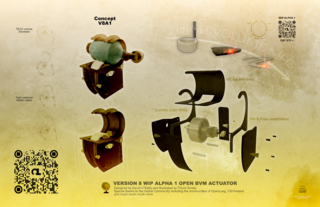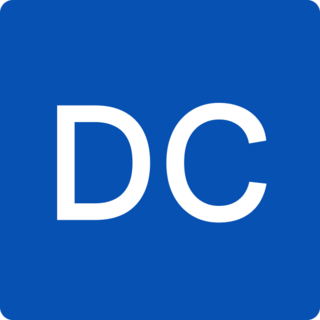
Git is a distributed version control system that tracks versions of files. It is often used to control source code by programmers who are developing software collaboratively.
A source-code-hosting facility is a file archive and web hosting facility for source code of software, documentation, web pages, and other works, accessible either publicly or privately. They are often used by open-source software projects and other multi-developer projects to maintain revision and version history, or version control. Many repositories provide a bug tracking system, and offer release management, mailing lists, and wiki-based project documentation. Software authors generally retain their copyright when software is posted to a code hosting facilities.
HTML Tidy is a console application for correcting invalid HyperText Markup Language (HTML), detecting potential web accessibility errors, and for improving the layout and indent style of the resulting markup. It is also a cross-platform library for computer applications that provides HTML Tidy's features.
This is a comparison of web frameworks for front-end web development that are reliant on JavaScript code for their behavior.
Protocol Buffers (Protobuf) is a free and open-source cross-platform data format used to serialize structured data. It is useful in developing programs that communicate with each other over a network or for storing data. The method involves an interface description language that describes the structure of some data and a program that generates source code from that description for generating or parsing a stream of bytes that represents the structured data.

GitHub is a proprietary developer platform that allows developers to create, store, manage, and share their code. It uses Git to provide distributed version control and GitHub itself provides access control, bug tracking, software feature requests, task management, continuous integration, and wikis for every project. Headquartered in California, it has been a subsidiary of Microsoft since 2018.
Seeks is a free and open-source project licensed under the GNU Affero General Public License version 3 (AGPL-3.0-or-later). It exists to create an alternative to the current market-leading search engines, driven by user concerns rather than corporate interests. The original manifesto was created by Emmanuel Benazera and Sylvio Drouin and published in October 2006. The project was under active development until April 2014, with both stable releases of the engine and revisions of the source code available for public use. In September 2011, Seeks won an innovation award at the Open World Forum Innovation Awards. The Seeks source code has not been updated since April 28, 2014 and no Seeks nodes have been usable since February 6, 2016.

OpenRefine is an open-source desktop application for data cleanup and transformation to other formats, an activity commonly known as data wrangling. It is similar to spreadsheet applications, and can handle spreadsheet file formats such as CSV, but it behaves more like a database.
In computing, a distributed file system (DFS) or network file system is any file system that allows access from multiple hosts to files shared via a computer network. This makes it possible for multiple users on multiple machines to share files and storage resources.

My Tracks was a Global Positioning System (GPS) tracking application that ran on Android. The application used a device's GPS capabilities to collect data, allowing real-time review of path, speed, distance, and elevation. Later, this data could be saved to Google Maps, Google Fusion Tables, or Google Docs and shared with Google+, Facebook, or Twitter. The application also allowed a user to record annotations along the path, hear periodic voice announcements of progress, and sync with select third-party bio-metric sensors.

Tox is a peer-to-peer instant-messaging and video-calling protocol that offers end-to-end encryption. The stated goal of the project is to provide secure yet easily accessible communication for everyone. A reference implementation of the protocol is published as free and open-source software under the terms of the GNU GPL-3.0-or-later.
GitLab Inc. is a company that operates and develops GitLab, an open-core DevOps software package that can develop, secure, and operate software. GitLab includes a distributed version control system based on Git, including features such as access control, bug tracking, software feature requests, task management, and wikis for every project, as well as snippets.

Shadowsocks is a free and open-source encryption protocol project, widely used in China to circumvent Internet censorship. It was created in 2012 by a Chinese programmer named "clowwindy", and multiple implementations of the protocol have been made available since. Shadowsocks is not a proxy on its own, but (typically) is the client software to help connect to a third-party SOCKS5 proxy. Once connected, internet traffic can then be directed through the proxy. Unlike an SSH tunnel, Shadowsocks can also proxy User Datagram Protocol (UDP) traffic.
openSNP is an open source website where users can share their genetic information. Users upload their genes, including gender, age, eye color, medical history, Fitbit data. With a focus on user patient-led research (PLR), there is potential to redefine the way health research is conducted.
"It promises to be a vital supplement to standard research: it can focus on conditions that are neglected by standard research, such as rare diseases or side effects, and can draw on a broader range of data and deliver outcomes more rapidly. It can also be a way of realising valuable forms of social interaction and support in cases where members of a community conduct PLR together, for example, patients suffering from the same illness."

Project Jupyter is a project to develop open-source software, open standards, and services for interactive computing across multiple programming languages.

An open source ventilator is a disaster-situation ventilator made using a freely licensed (open-source) design, and ideally, freely available components and parts. Designs, components, and parts may be anywhere from completely reverse-engineered or completely new creations, components may be adaptations of various inexpensive existing products, and special hard-to-find and/or expensive parts may be 3D-printed instead of purchased. As of early 2020, the levels of documentation and testing of open source ventilators was well below scientific and medical-grade standards.

Data Commons is an open-source platform created by Google that provides an open knowledge graph, combining economic, scientific and other public datasets into a unified view. Ramanathan V. Guha, a creator of web standards including RDF, RSS, and Schema.org, founded the project, which is now led by Prem Ramaswami.
GitHub Copilot is a code completion and automatic programming tool developed by GitHub and OpenAI that assists users of Visual Studio Code, Visual Studio, Neovim, and JetBrains integrated development environments (IDEs) by autocompleting code. Currently available by subscription to individual developers and to businesses, the generative artificial intelligence software was first announced by GitHub on 29 June 2021, and works best for users coding in Python, JavaScript, TypeScript, Ruby, and Go. In March 2023 GitHub announced plans for "Copilot X", which will incorporate a chatbot based on GPT-4, as well as support for voice commands, into Copilot.







